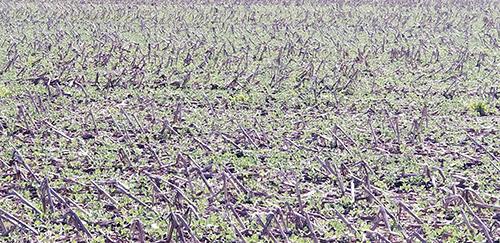
Credit: College of ACES, University of Illinois.
URBANA, Ill. – Soil erosion is a major challenge in agricultural production. It affects soil quality and carries nutrient sediments that pollute waterways. While soil erosion is a naturally occurring process, agricultural activities such as conventional tilling exacerbate it. Farmers implementing no-till practices can significantly reduce soil erosion rates, a new University of Illinois study shows.
Completely shifting to no-till would reduce soil loss and sediment yield by more than 70%, says Sanghyun Lee, doctoral student in the Department of Agricultural and Biological Engineering at U of I and lead author on the study, published in Journal of Environmental Management.
But even a partial change in tilling practices could have significant results, he adds.
“If we focus on the most vulnerable area in terms of soil erosion, then only 40% no-till shows almost the same reduction as 100% no-till implementation,” Lee says.
The study used physical data and computer modeling to estimate soil erosion in the Drummer Creek watershed, which is part of the Upper Sangamon River watershed in Central Illinois. The area’s main crops are corn and soybeans, and tillage is a predominant agricultural practice.
“The rate of soil erosion is increased and accelerated by unsustainable agricultural production. One of the main reasons is conventional tillage in the field,” Lee says. “Our model provides a tool to estimate the impacts of tilling on soil erosion across the watershed.”
Lee and co-authors Maria Chu, Jorge Guzman, and Alejandra Botero-Acosta developed the modeling framework, coupling a hydrological model (MIKE SHE) with the Water Erosion Prediction Project (WEPP) to examine the impacts of no-till practice in the watershed. The WEPP model provided the sediment sources from the agricultural fields under different tillage practices and the hydrologic model simulated sediment transport across the watershed.
The researchers included historical data on climate, soil properties, sediment sample data, and other relevant measures, then used the coupled model to predict how different management practices affect soil erosion rates.
“Farmers may prefer tilling because wet climate conditions cause compacted soil,” Lee says. “However, soil erosion removes topsoil, which contains lots of nutrients, and this may reduce yield in the long term. Soil erosion also affects water quality, both locally over time and at a distance.
“Therefore, farmers need to weigh the benefits of tilling with the consequences of soil erosion and choose the best management strategies.”
The modeling framework can help identify the most vulnerable areas, so producers can implement sustainable management practices where it matters most, Lee notes.
###
The Department of Agricultural and Biological Engineering is in the College of Agricultural, Consumer and Environmental Sciences and The Grainger College of Engineering, University of Illinois.
The article, “A comprehensive modeling framework to evaluate soil erosion by water and tillage,” is published in Journal of Environmental Management. [https:/
Authors are Sanghyun Lee, Maria Chu, Jorge Guzman, and Alejandra Botero-Acosta.
Funding was provided by the U.S. Department of Agriculture¬-National Institute of Food and Agriculture (NIFA) project # ILLU-741- 380.
Media Contact
Marianne Stein
[email protected]
Original Source
https:/
Related Journal Article
http://dx.




